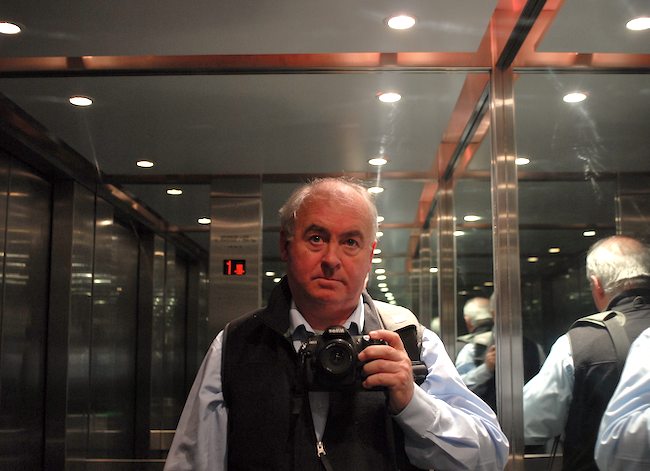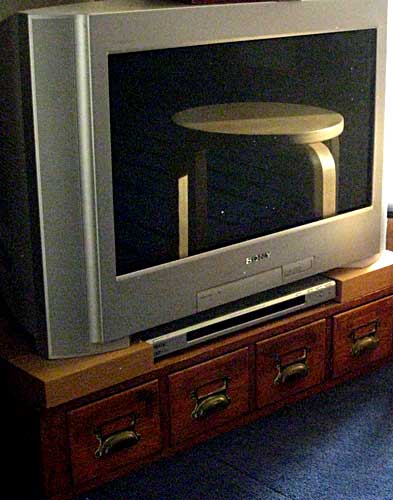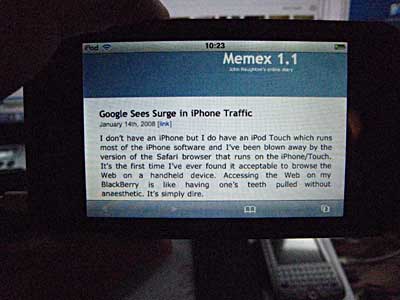
Well, in a lift/elevator anyway.


Well, in a lift/elevator anyway.
Tim Wu has an intriguing piece in Slate Magazine in which he ponders the implications of AT&T’s announcement that it is seriously considering plans to examine all the traffic it carries for potential violations of U.S. intellectual property laws. (A similar idea is about to be foisted on UK ISPs by Gordon Broon & Co.)
“No one knows exactly what AT&T is proposing to build”, he writes. “But if the company means what it says, we’re looking at the beginnings of a private police state. That may sound like hyperbole, but what else do you call a system designed to monitor millions of people’s Internet consumption? That’s not just Orwellian; that’s Orwell.”
That’s just the civil libertarian aspect of the idea. The interesting thing is that the commercial downsides could be catastrophic — for AT&T.
The most serious problems for AT&T may be legal. Since the beginnings of the phone system, carriers have always wanted to avoid liability for what happens on their lines, be it a bank robbery or someone’s divorce. Hence the grand bargain of common carriage: The Bell company carried all conversations equally, and in exchange bore no liability for what people used the phone for. Fair deal.
AT&T’s new strategy reverses that position and exposes it to so much potential liability that adopting it would arguably violate AT&T’s fiduciary duty to its shareholders. Today, in its daily Internet operations, AT&T is shielded by a federal law that provides a powerful immunity to copyright infringement. The Bells know the law well: They wrote and pushed it through Congress in 1998, collectively spending six years and millions of dollars in lobbying fees to make sure there would be no liability for “Transitory Digital Network Communications”—content AT&T carries over the Internet. And that’s why the recording industry sued Napster and Grokster, not AT&T or Verizon, when the great music wars began in the early 2000s.
Here’s the kicker: To maintain that immunity, AT&T must transmit data “without selection of the material by the service provider” and “without modification of its content.” Once AT&T gets in the business of picking and choosing what content travels over its network, while the law is not entirely clear, it runs a serious risk of losing its all-important immunity. An Internet provider voluntarily giving up copyright immunity is like an astronaut on the moon taking off his space suit. As the world’s largest gatekeeper, AT&T would immediately become the world’s largest target for copyright infringement lawsuits….
Tim Wu is a great commentator on this stuff, and this is an especially good piece.
You have to see the Jobs Keynote to appreciate the joke.
Thanks to Michael and Laura for the link.
From a conversation with John Markoff…
Today he had a wide range of observations on the industry, including the Amazon Kindle book reader, which he said would go nowhere largely because Americans have stopped reading.
“It doesn’t matter how good or bad the product is, the fact is that people don’t read anymore,” he said. “Forty percent of the people in the U.S. read one book or less last year. The whole conception is flawed at the top because people don’t read anymore.”
Direct link here (courtesy of Engadget). These annual presentations are the hottest tickets on the trade circuit, but this one had an oddly perfunctory air, despite the raft of new products and services that Steve Jobs announced. The audience was oddly muted and respectful; new products or features were greeted not with the raucous, foot-stomping, whistling euphoria of yesteryear, but with ripples of polite applause. And the reaction shots suggested an audience comprised of a high proportion of suits. Could it be that the Jobs Keynote has become the tech equivalent of the Annual General Meeting of Berkshire Hathaway, Warren Buffett’s holding company — where people pay over $100k for a single share in the company (currently trading at $129,720 a share) just to buy the right to attend the meeting and sit at the Sage of Omaha’s feet?
There were the usual nauseating interludes when the Chief Execs of Apple’s commercial ‘partners’ are invited on stage for a brief share of the limelight. This year’s scene with Paul Otellini, the Intel CEO, rated three on the Sickbag Scale.
Still, Jobs remains the best embodiment of CEO-as-evangelist there is. And what other company would be able to round off a technical presentation with a live performance by Randy Newman?
Rory Cellan-Jones has taken a sceptical look at the ‘newsworthiness’ of the Apple announcements. He rates the iTunes movie-rental deal at 7/10 and the new ultra-thin laptop at 6/10. His colleagues think Apple gets too much media attention. In terms of its impact on people’s lives, the Ford Focus is more important than anything announced by Steve Jobs.
Which is true. The laptop is called the MacBook Air, btw. Why ‘Air’? Because, says TechCrunch, that’s the only thing left in your wallet after you’ve bought one. It’s £1,199 in the UK, apparently. Shipping in two weeks.
And, for busy folks, here’s the gist of the 90-minute keynote in 60 seconds.
Robert Peston, the BBC’s Business Editor, has a hunch that the published figure (£500k) is a bit low…
Whatever your political bent or view of the Blair years, it would be a national humiliation if the sticker on his forehead said $1000k.
His franchise is worth more.
For a million dollars to be the number on his ticket, Wall Street and the City would be in total meltdown and we would be in the grip of a worldwide recession (we may get there yet).
It couldn’t be the right price – especially since Blair takes advice from a bunch of astute business people and he isn’t famous for knowingly underselling himself.
So when the Daily Telegraph reported that he is being paid £2m a year, I thought that was more like it.
But it still didn’t feel right.
My intuitive view was that you couldn’t have a Blair for less than $5m a year.
And having now spoken to bankers close to this deal, I am told $5m is what JP Morgan is paying (though Morgan’s and Blair’s office are refusing to publish the pecuniary details).
Thanks to James Miller for the link.

 (With apologies to Magritte.)
(With apologies to Magritte.)

I don’t have an iPhone but I do have an iPod Touch which runs most of the iPhone software and I’ve been blown away by the version of the Safari browser that runs on the iPhone/Touch. It’s the first time I’ve ever found it acceptable to browse the Web on a handheld device. Accessing the Web on my BlackBerry is like having one’s teeth pulled without anaesthetic. It’s simply dire.
Looks like I’m not alone in this:
On Christmas, traffic to Google from iPhones surged, surpassing incoming traffic from any other type of mobile device, according to internal Google data made available to The New York Times. A few days later, iPhone traffic to Google fell below that of devices powered by the Nokia-backed Symbian operating system but remained higher than traffic from any other type of cellphone.
The data is striking because the iPhone, an Apple product, accounts for just 2 percent of smartphones worldwide, according to IDC, a market research firm. Phones powered by Symbian make up 63 percent of the worldwide smartphone market, while those powered by Microsoft’s Windows Mobile have 11 percent and those running the BlackBerry system have 10 percent.
The iPhone has taken the frustration out of browsing on a mobile phone, said Charles Wolf, an analyst with Needham & Company.
Other companies confirmed the trends, if not the specific data, observed by Google. Yahoo, for instance, said iPhones accounted for a disproportionate amount of its mobile traffic. And AdMob, a firm that shows billions of ads on mobile Web sites every month, said it saw traffic from iPhones surge drastically around Christmas.
“Consumers are going to demand Internet browsers” as good as Apple’s, said Vic Gundotra, a Google vice president who oversees mobile products…
The stats are significant: Google is seeing almost as much traffic from a device that has 2 per cent of the phone market as from Symbian phones which have 63 per cent of the market. There’s a lesson there, Nokia.
… or is it back to the future? Lovely column by Stephen Fry on walled gardens and social networking…
I am old enough to remember Prestel and the original bulletin boards and “commercial online services” Prodigy, CompuServe and America Online. These were closed communities. You paid a subscription, dialled in and connected. You made new friends and you chatted in “rooms” designated for the purpose according to special interests, hobbies and propensities. CompuServe and AOL were shockingly late to add what was called an “internet ramp” in the 90s. This allowed those who dialled up to go beyond the confines of the provider’s area and explore the strange new world of the internet unsupervised. AOL offered its members a hopeless browser and various front ends that it hoped would keep people loyal to its squeaky-clean, closed world. This lasted through the 90s as it covered the planet in CDs in an attempt to recruit subscribers. A lost cause, naturally, and the company ended up as little more than an ordinary ISP. Made millions for Steve Case on the way as AOL merged with Time Warner, but that’s another story.
Opening and closing like a flower
My point is this: what an irony! For what is this much-trumpeted social networking but an escape back into that world of the closed online service of 15 or 20 years ago? Is it part of some deep human instinct that we take an organism as open and wild and free as the internet, and wish then to divide it into citadels, into closed-border republics and independent city states? The systole and diastole of history has us opening and closing like a flower: escaping our fortresses and enclosures into the open fields, and then building hedges, villages and cities in which to imprison ourselves again before repeating the process once more. The internet seems to be following this pattern…
Thanks to Pete for the link.